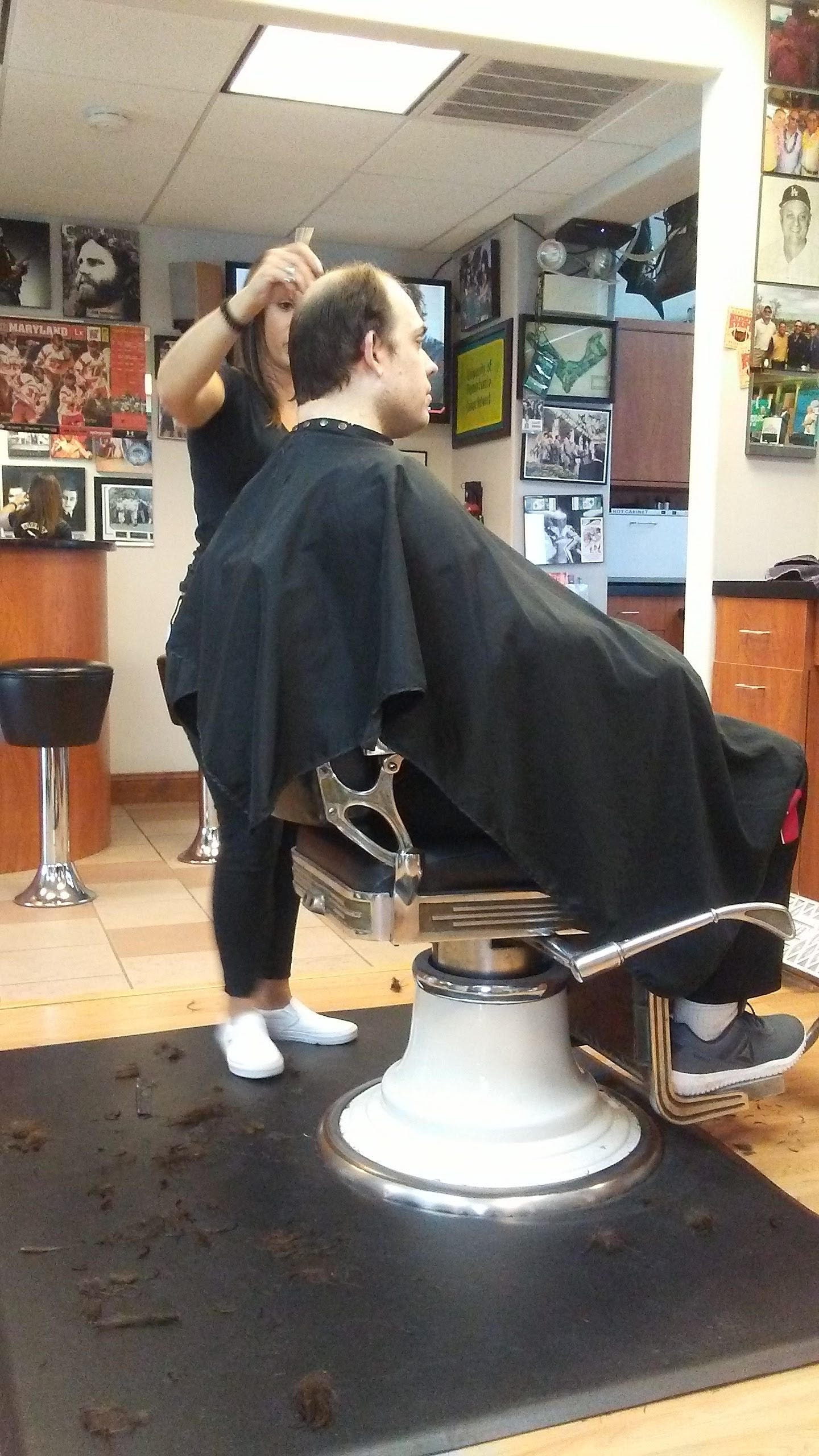His eyes are closed but the lids flutter; even though he’s sitting straight up, he could be in a state of REM sleep, but I know he’s processing the question I just asked him. He’s heard me, so I don’t repeat it. I calmly take a bite from my chicken salad wrap and wait. Patience is not only a virtue but a necessity when dealing with an adult who has Asperger’s Syndrome. As Mahatma Gandhi said, “To lose patience is to lose the battle.”
I win a lot more than I lose. Today was a win.
It began last week when I asked Allen if he was ready for a haircut. He ran his hand over his uncombed locks and said, “Yeah. Guess it’s time to see Rachel.”
Rachel is the diminutive saint slash stylist who works at Benny’s in Springfield and the only one Allen has allowed to touch his hair for the last six years. She needs to stand on a stool to reach the top of his head but she “gets him” in a way only a handful of people do. She doesn’t expect him to engage in conversation, but also never acts surprised if he wants to talk. She warns him before she touches his hair to prevent the flinching that results from an unexpected hand. To me, it’s worth the 30-minute drive to Benny’s. Getting Allen to consider haircuts as a fairly regular practice was a long battle I’m not fighting again. You can read about that battle below.
Voices from the Edge: Tale of a Haircut
My youngest child got his haircut yesterday, and as I sat watching the very patient hairdresser continually checking with him and asking if he was alright, I almost began to cry. Haircuts can be trau…
But my day off was Monday and Benny’s was closed. They’d also be closed on
President’s Day, my next day off.
I explained the situation to Allen. He shrugged.
“Guess I’ll wait.”
Which would be alright, except I know my son. Allen doesn’t like the feel of a comb or brush against his scalp. It feels, he says, “Like electric shocks”, so he mostly finger-combs his hair unless we’re headed to church. It’s a recipe for clumps. That becomes dreadlocks. Which become hard to deal with.
But, hey, patience is my strong suit. So I was nonchalant.
“Okay,” I said. “Probably be two months. Or,” and I tossed this out casually, “you could go to my stylist. She’s open on Mondays.”
An almost imperceptible nod of his head indicated he’d heard. But he had. I filed the information away.
A few days later, Allen plopped himself down in the rocking chair in my office. I was busy at my computer, but I knew he’d speak when he was ready.
“What’s the name of your stylist?” he asked quietly.
“Umm? Oh, Tasia.” I waited a beat. “She’s nice.”
“And she does guy hair?”
I shrugged. “Probably.”
A day later, Allen told me he “wouldn’t mind” going to Tasia since it would be a while until he could see Rachel.
I agreed to book an appointment. Inside, I cheered. Seeing someone new–a stranger–was major in Allen's world.
Now, haircut done and eating lunch at our favorite diner, I’ve asked Allen if he liked the way Tasia cut his hair. I take another bite from my wrap and watch Allen’s eyelids flutter as he processes an answer. I count the successes of this quest:
Allen consented to have someone new and unknown cut his hair.
He was quiet while Tasia worked, but polite. His responses to her gentle questions were single syllables, but he did respond.
He thanked her when he was done.
When Tasia said, “I’ve heard a lot about you from your mom,” Allen responded in a socially expected manner with, “You, too.” He hadn't really, but he recognized a social obligation to respond.
That’s a lot from a haircut.
Allen’s eyelids stop their imitations of a hummingbird’s wings and he looks at me with his sky-blue eyes. He pats his hair. “It’s okay,” he says and sips his root beer. He looks up from his plate a moment later. “I still like Rachel, you know, but if she’s busy, it’d be okay to see Tasia again.”Then he attacks his pizza burger with a side of fries. His usual order at our usual diner.
But it’s not usual at all, because today Allen did something unusual. He took what might seem to others a small step outside his comfort zone.
And for Allen, that’s huge.
Every day, I continue to learn something new from Allen. Is there a person in your life who helps you to be your best self?






My son was developmentally delayed, had tons of services as a student, and has done well academically - he is now a senior mechanical engineering major about to graduate - and even though he is technically not PDD-NOS anymore (probably a high functioning autism diagnosis would be currently appropriate, but he hasn't been reassessed as an adult), he still has issues trying to translate social interactions into a form he can understand with his math-oriented mind. Every time he makes a new connection or successfully navigates a tricky social situation with professors and classmates, I cheer inside.
Thank you for sharing this milestone for your son. To answer your question, I think of many of the small groups I've led over the years. Each woman comes with her own set of experiences and temperament. I've learned to wait, not forcing them to share until they're ready.